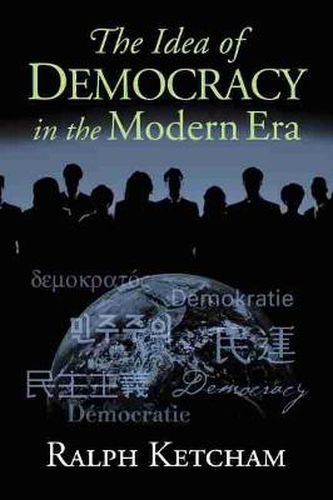Readings Newsletter
Become a Readings Member to make your shopping experience even easier.
Sign in or sign up for free!
You’re not far away from qualifying for FREE standard shipping within Australia
You’ve qualified for FREE standard shipping within Australia
The cart is loading…






This title is printed to order. This book may have been self-published. If so, we cannot guarantee the quality of the content. In the main most books will have gone through the editing process however some may not. We therefore suggest that you be aware of this before ordering this book. If in doubt check either the author or publisher’s details as we are unable to accept any returns unless they are faulty. Please contact us if you have any questions.
Although the last half of the twentieth century has been called the Age of Democracy, the twenty-first has already demonstrated the fragility of its apparent triumph as the dominant form of government throughout the world. Reassessing the fate of democracy for our time, distinguished political theorist Ralph Ketcham traces the evolution of this idea over the course of four hundred years. He traces democracy’s bumpy ride in a book that is both an exercise in the history of ideas and an explication of democratic theory. Ketcham examines the rationales for democratic government, identifies the fault lines that separate democracy from good government, and suggests ways to strengthen it in order to meet future challenges. Drawing on an encyclopedic command of history and politics, he examines the rationales that have been offered for democratic government over the course of four manifestations of modernity that he identifies in the Western and East Asian world since 1600. Ketcham first considers the fundamental axioms established by theorists of the Enlightenment - Bacon, Locke, Jefferson - and reflected in America’s founding, then moves on to the mostly post-Darwinian critiques by Bentham, Veblen, Dewey, and others that produced theories of the liberal corporate state. He explains late-nineteenth-century Asian responses to democracy as the third manifestation, grounded in Confucian respect for communal and hierarchical norms, followed by late-twentieth-century postmodernist thought that views democratic states as oppressive and seeks to empower marginalized groups. Ketcham critiques the first, second, and fourth modernity rationales for democracy and suggests that the Asian approach may represent a reconciliation of ancient wisdom and modern science better suited to today’s world. He advocates a reorientation of democracy that de-emphasizes group or identity politics and restores the wholeness of the civic community, proposing a return to the Jeffersonian universalism - that which informed the founding of the United States - if democracy is to flourish in a fifth manifestation. The Idea of Democracy in the Modern Era is an erudite, interdisciplinary work of great breadth and complexity that looks to the past in order to reframe the future. With its global overview and comparative insights, it will stimulate discussion of how democracy can survive - and thrive - in the coming era.
$9.00 standard shipping within Australia
FREE standard shipping within Australia for orders over $100.00
Express & International shipping calculated at checkout
This title is printed to order. This book may have been self-published. If so, we cannot guarantee the quality of the content. In the main most books will have gone through the editing process however some may not. We therefore suggest that you be aware of this before ordering this book. If in doubt check either the author or publisher’s details as we are unable to accept any returns unless they are faulty. Please contact us if you have any questions.
Although the last half of the twentieth century has been called the Age of Democracy, the twenty-first has already demonstrated the fragility of its apparent triumph as the dominant form of government throughout the world. Reassessing the fate of democracy for our time, distinguished political theorist Ralph Ketcham traces the evolution of this idea over the course of four hundred years. He traces democracy’s bumpy ride in a book that is both an exercise in the history of ideas and an explication of democratic theory. Ketcham examines the rationales for democratic government, identifies the fault lines that separate democracy from good government, and suggests ways to strengthen it in order to meet future challenges. Drawing on an encyclopedic command of history and politics, he examines the rationales that have been offered for democratic government over the course of four manifestations of modernity that he identifies in the Western and East Asian world since 1600. Ketcham first considers the fundamental axioms established by theorists of the Enlightenment - Bacon, Locke, Jefferson - and reflected in America’s founding, then moves on to the mostly post-Darwinian critiques by Bentham, Veblen, Dewey, and others that produced theories of the liberal corporate state. He explains late-nineteenth-century Asian responses to democracy as the third manifestation, grounded in Confucian respect for communal and hierarchical norms, followed by late-twentieth-century postmodernist thought that views democratic states as oppressive and seeks to empower marginalized groups. Ketcham critiques the first, second, and fourth modernity rationales for democracy and suggests that the Asian approach may represent a reconciliation of ancient wisdom and modern science better suited to today’s world. He advocates a reorientation of democracy that de-emphasizes group or identity politics and restores the wholeness of the civic community, proposing a return to the Jeffersonian universalism - that which informed the founding of the United States - if democracy is to flourish in a fifth manifestation. The Idea of Democracy in the Modern Era is an erudite, interdisciplinary work of great breadth and complexity that looks to the past in order to reframe the future. With its global overview and comparative insights, it will stimulate discussion of how democracy can survive - and thrive - in the coming era.